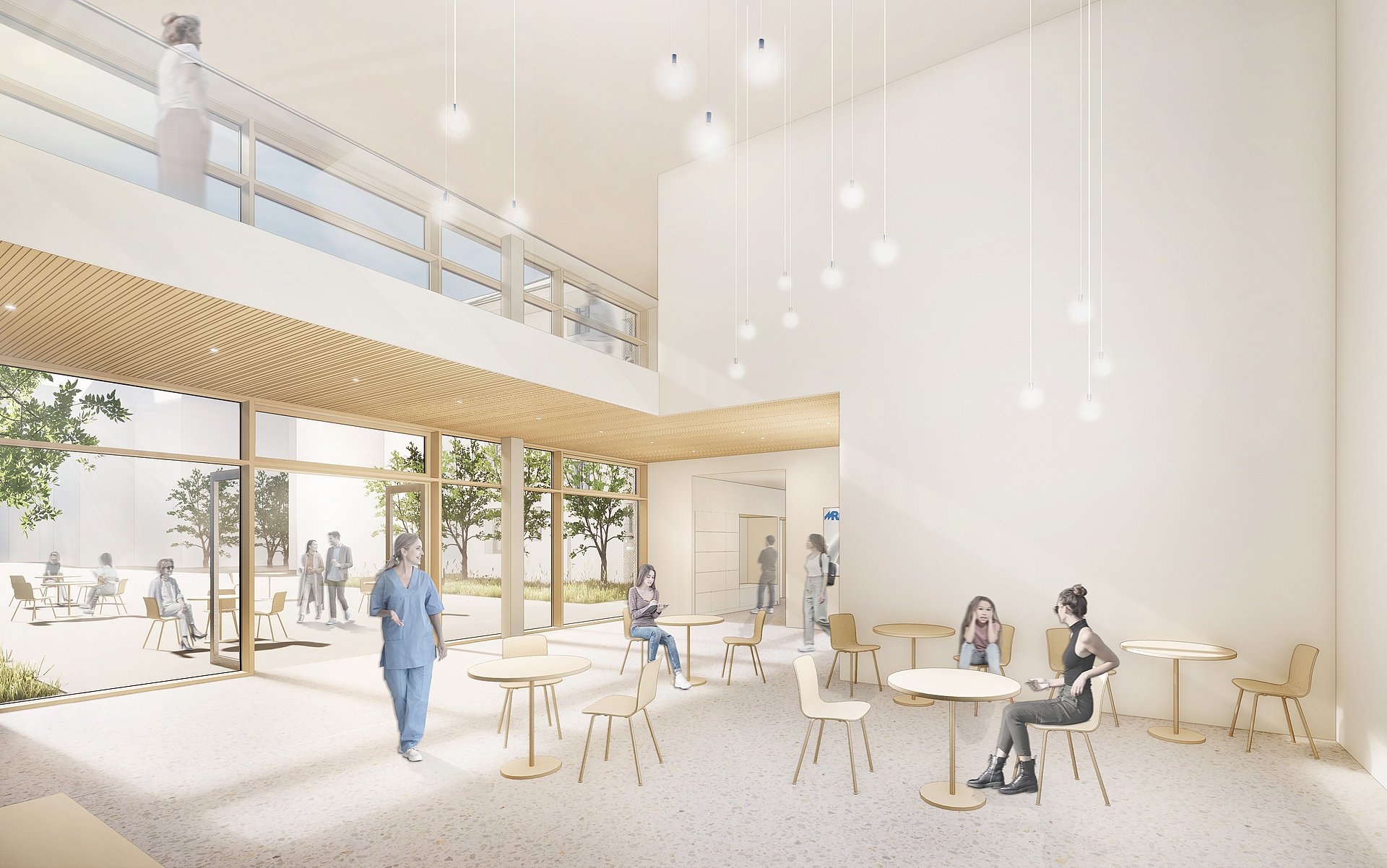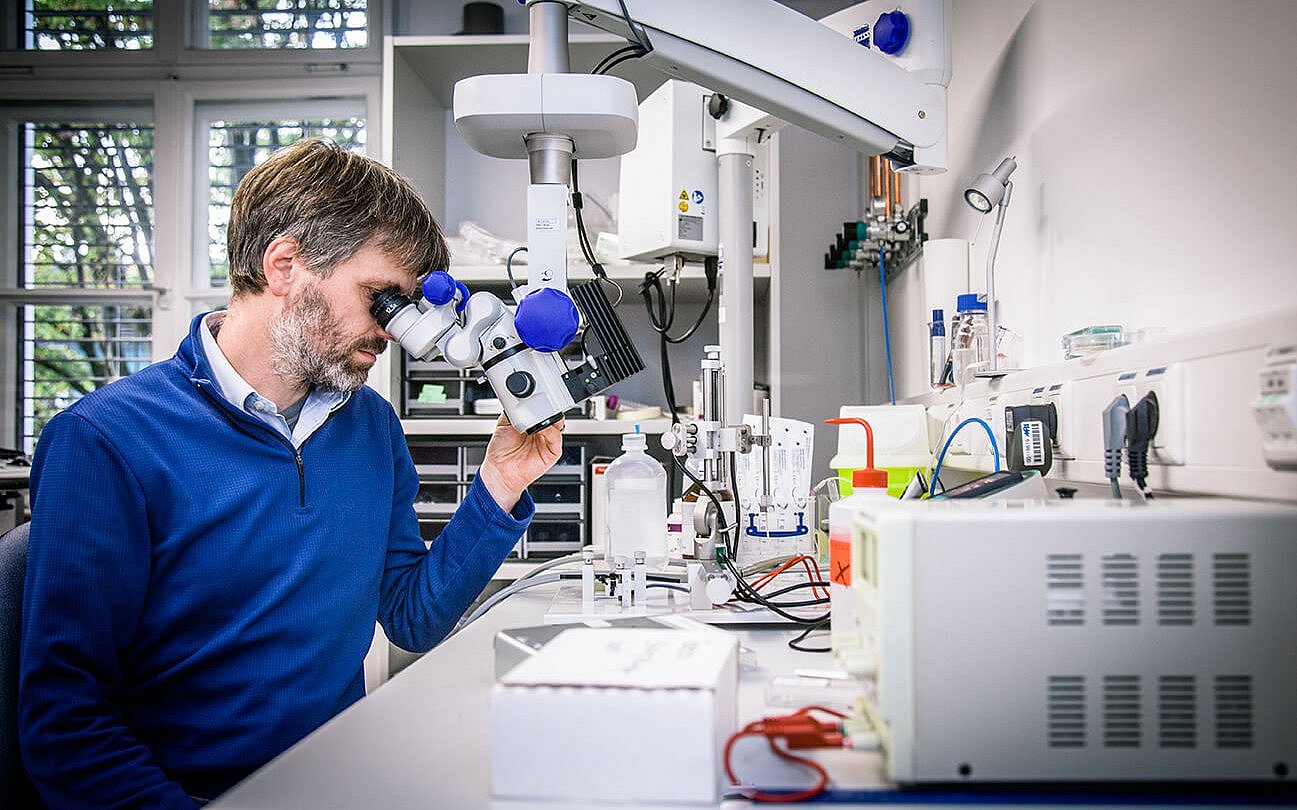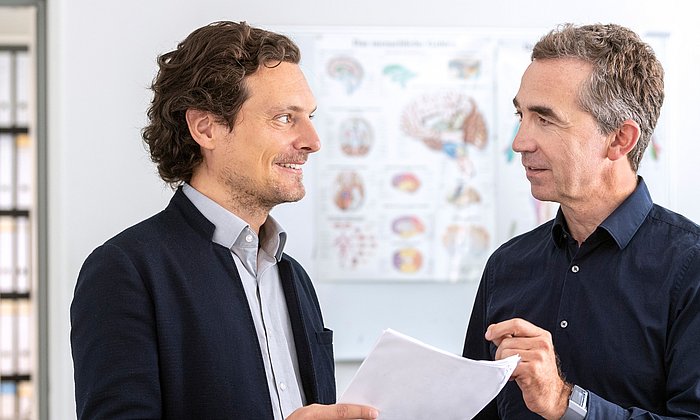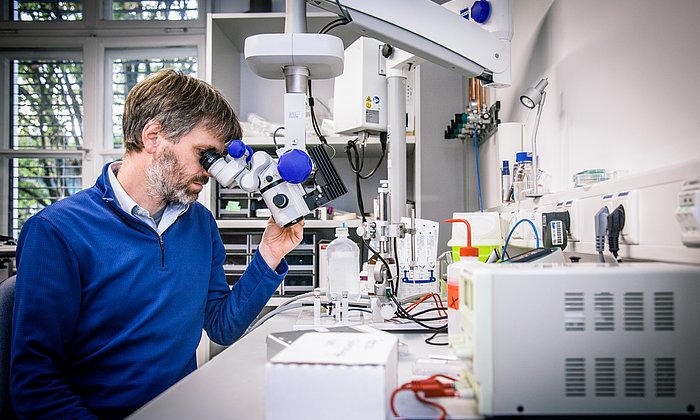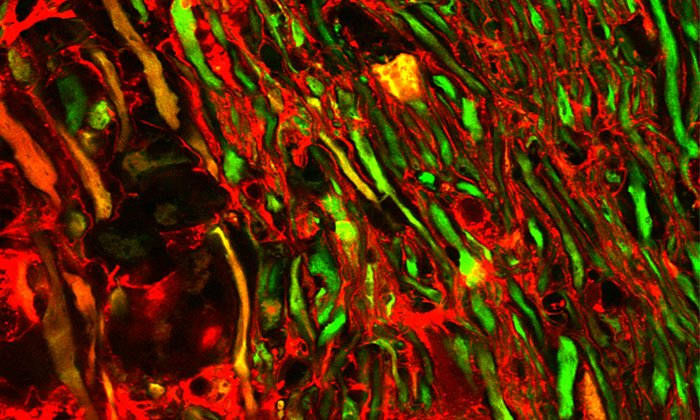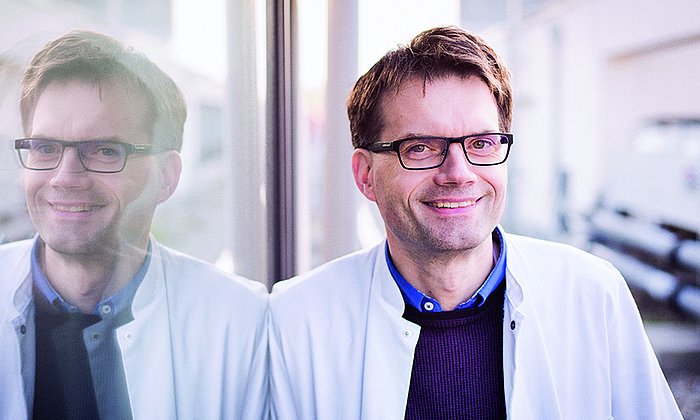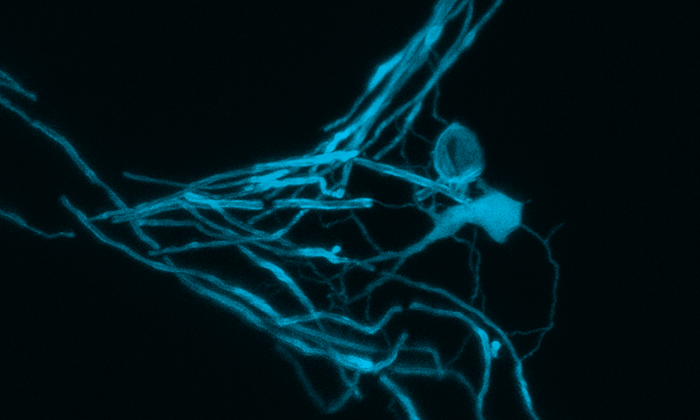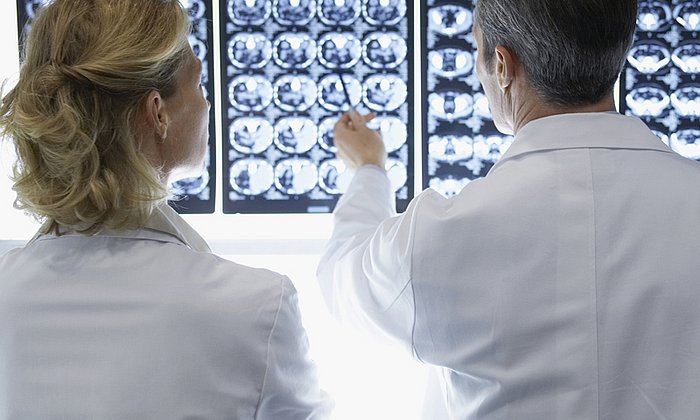Research at the new Center for Multiple Sclerosis and Neurosciences
Improving the lives of MS patients
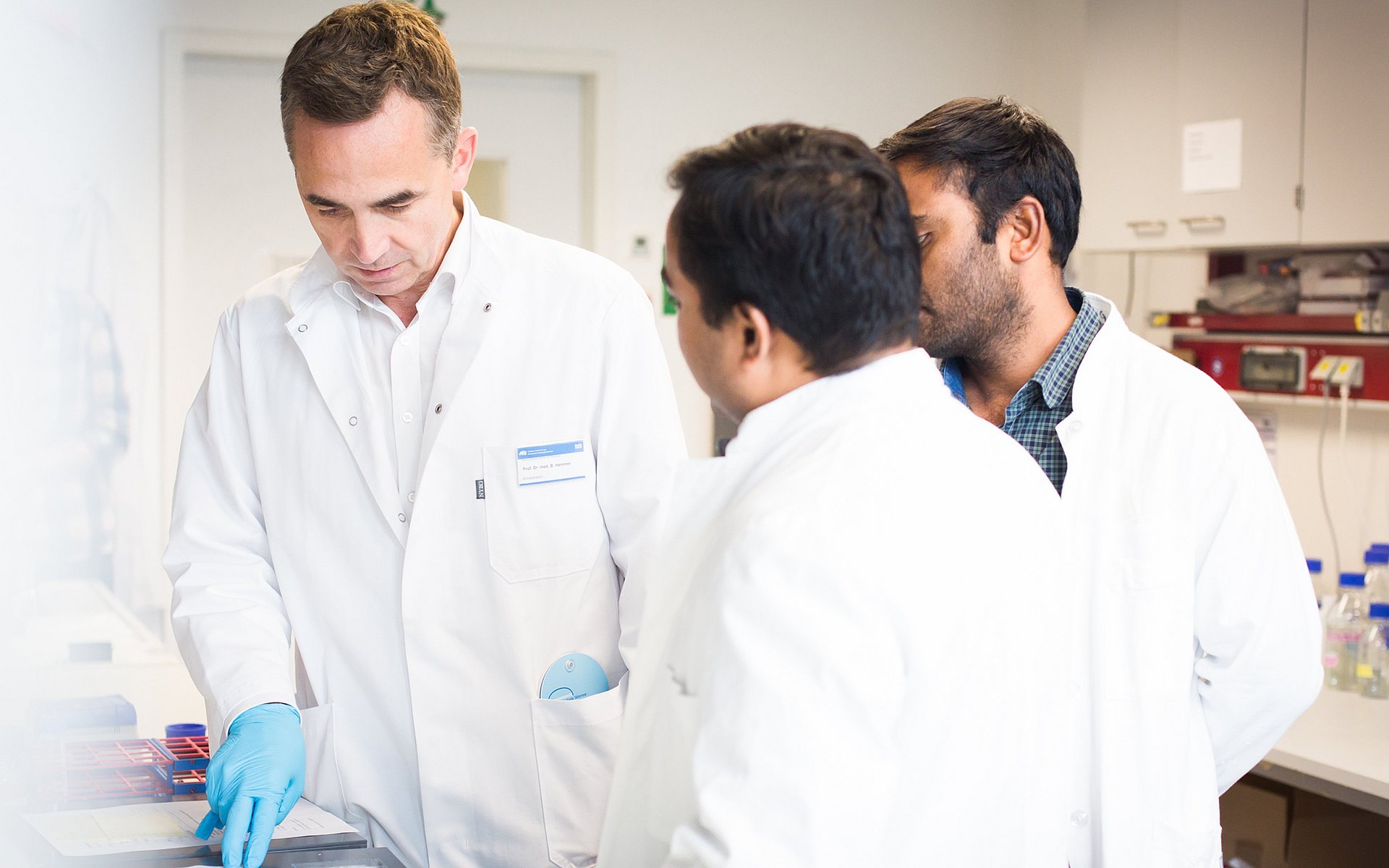
More stories of issue 1/2023 of the magazine TUMcampus
Multiple sclerosis (MS) has always been regarded as the illness of a thousand faces. Every case of MS follows a different course: In particular, patients often suffer from a widely varied range of frequently very unspecific symptoms in the initial stages of this illness, in which the body's immune system destroy parts of the nervous system. And while in some cases the disease only progresses very gradually, even sometime not at all for years at a time, in other cases it progresses rapidly into a serious illness.
Multiple sclerosis is an autoimmune disease in which the body's immune system turns against the component parts of the central nervous system. In particular, immune system cells destroy the protective myelin sheath which surrounds the cell's long axons. This disturbs the cell's signal transmission, resulting in a kind of short circuit within the nervous system. Typical symptoms of the initial stages of the disease include sensory disorders in the arms or legs, vision disorders, balance problems and paralysis.
Research, development and treatment, all at a single location
The essential goals for future work at the TUM Center for Multiple Sclerosis and Neurosciences include understanding MS in detail, being able to treat it better than before and at the same time improving quality of life for the patient. The Center building, under construction at the university hospital TUM Klinikum rechts der Isar, is set to open its doors in about three years. The Center will be a single location hosting further research into the disease as well as patient examination and treatment based on the latest state-of-the-art knowledge. Patients will also find meeting space at the Center where they will be able to help one another deal with the illness in everyday life.
Although the primary focus will be on multiple sclerosis, the scientists working at the Center will also conduct research on other diseases of the nervous system. "Especially in the later stages of the illness, when nerve cell mortality rises, in many respects MS resembles for example a stroke or Alzheimer's disease," says Prof. Thomas Misgeld of the TUM Institute of Neuronal Cell Biology. "We therefore plan to generate synergies by working together with experts on these other diseases," says Misgeld.
Data for the right therapy
"It's important to us that the researchers constantly focus on our patients and their needs and that new findings make their way as quickly as possible to those suffering from the disease," says Prof. Bernhard Hemmer, Director of the Clinic for Neurology at the university hospital TUM Klinikum rechts der Isar. Important questions which Hemmer would like to devote more effort to involve the reasons and possible indications for the wide variety of forms the course of MS can follow. "Whether or not the illness breaks out and how quickly it progresses is the result of the interaction of a large number of partially unknown factors," the medical researcher points out.
Genes are known to play a role; furthermore variable aspects such as vitamin D deficiencies, smoking, obesity or a prior infection with the Epstein-Barr virus can affect the development and course of MS as well, as can other diseases such as diabetes or high blood pressure. "Our goal is to capture a widely varied range of information on the patients," says Hemmer. "We want to develop biomarkers which can be detected in the bloodstream, in cerebrospinal fluid and with imaging methods – and which can tell us reliably how intensive and how long we should treat a given patient in order to keep the individual symptom-free for as long as possible."
It's important to us that the researchers constantly focus on our patients and their needs.
Professor of Neurology
Recent years have seen the development of a variety of highly efficacious pharmaceuticals which work particularly well in the early stages of MS, usually characterized by recurring waves of inflammatory illnesses. "Both the desired and undesirable effects of these medications, which are aimed at the immune system, vary in intensity," says Hemmer. "And it would mean great progress if from the very beginning we could use biomarkers for every person with MS to find the optimally matching active ingredient."
Identification of this kind of biomarker requires enormous amounts of patient data, which Hemmer and his colleagues have in some cases been collecting for years in the course of various studies. "In order to collect and analyze this data with the most modern methods, we'll be working together closely with the Center for Digital Medicine and Health (ZDMG), which is planned for completion as an expansion next to the MS building by 2027," says Hemmer. This will make it possible for research staff to work together optimally with data analysis experts.
It takes time
Several years ago Nadja Birkenbach-von Kuzenko learned first-hand how long it can take to find exactly the medication which is best for the individual in question. She was diagnosed with MS in 2015. "I suddenly started seeing double and when I walked, the image of my surroundings would shake back and forth," she recalls. Her immune system had already started to attack the two optic nerves which connect each eye to the brain. After a visit to the clinic's emergency room, Birkenbach-von Kuzenko went to Prof. Hemmer's office hours.
"After the first round of cortisone pulse therapy, the search began for the right long-term treatment for me with an immunomodulatory active ingredient," she recalls. She didn't handle the first three medications very well. "After that I needed to take a break," she says. But it wasn't long until the illness flared up again. "Then I tried out another medication, which it turns out has kept me free of symptoms and side-effects for four years now."
The idea is that in the early stages after diagnosis, patients should be accompanied by an individual who has already had MS for a longer period of time.
Mutual support
Birkenbach-von Kuzenko will have a meeting space for herself and other patients at the Center for Multiple Sclerosis and Neurosciences. "One day in December 2021 I came out of the MS outpatient clinic and I met a young woman on the street who was absolutely distraught; she had just received her MS diagnosis," she recounts. "She had so many questions and so many fears – exactly the ones I had in the initial stages of my own illness." Birkenbach-von Kuzenko then decided to share all her positive experiences of the past years with other patients: Together with Prof. Hemmer, whom she told of her plan several days later by e-mail, she launched a mentoring program for MS patients.
"The idea is that in the early stages after diagnosis, patients should be accompanied by an individual who has already had MS for a longer period of time," says Birkenbach-von Kuzenko. "The mentor can help the patient deal independently with illness-related situations that arise in everyday life and can help them live the most care-free and active life possible." Of course these two individuals can meet up wherever they like – but space will be available for them at the new Center.
Patients with MS often face very trying questions in the early phases of their illness: When and how will I tell my family, my friends, my colleagues? How strongly will this impact my life? Will I have to give up sports, quit my hobbies? How long will it take before I'm dependent on the help of others? In order to keep patients from feeling alone in this difficult situation, there is a mentoring program at the university hospital TUM Klinikum rechts der Isar for people with MS.
+49 89 4140-7640
ms-patenprogramm.nl@mri.tum.de
Investigation of the chronic phase
"In the meantime we can treat the initial phase of MS, which can sometimes last for decades, so well that many patients can lead an almost completely normal life," Hemmer continues. But up to now there are significantly fewer therapeutic possibilities for the phase in which the disease no longer flares up in waves, but rather progresses constantly. "We know that acute inflammation in the nervous system, which in the meantime we can monitor and suppress fairly well, then becomes less frequent," the physician explains. "However, we still don't really know why more and more nerve cells die off in the later chronic phase, under which some patients suffer from the very beginning, and we don't know how this process can be slowed or even stopped."
Prof. Misgeld and his colleagues are working intensively on these questions. "We will primarily be concentrating on three aspects," Misgeld says. A group led by the neurologist Prof. Thomas Korn is researching how to better prevent the late immune responses of MS, which involve other defense cells than those involved in the early phase. A second team led by neurobiologist Prof. Mikael Simons focuses on the question of how the brain's glial cells can be made to more effectively replace the protective and insulating myelin sheath of the nerve cells, which MS patients increasingly lose over time.
Overcoming the "energy crisis"
Prof. Misgeld and his team want to join forces with a group led by Angelika Harbauer, Professor for Neurons and Metabolism, to find out what exactly makes the nerve cells die off. "There are increasing indications that in the end the cells' energy metabolism fails," says Misgeld. "In order to overcome this cellular energy crisis, among other things we'll have to ensure that the long nerve cell axons receive adequate energy both from the cell body and via the neighboring glial cells, something like energy care-packages."
We're all working together so that in the not too distant future people with MS will be able to look forward to long, impairment-free lives.
Professor of Neurology
It's well known that energy crises are often difficult to fight: This calls for the joint efforts of a large number of individual people. "And this will be exactly the focus at the Center for Multiple Sclerosis and Neurosciences," says Prof. Hemmer. "We're all working together so that in the not too distant future people with MS will be able to look forward to long, impairment-free lives."
Beginning in 2026 it will be possible to treat approximately 2,000 patients suffering from multiple sclerosis at the Center for Multiple Sclerosis and Neurosciences. In addition, the new Center will unite research, therapy development and treatment at a single location. The new construction is being made possible in large part by a donation from the Klaus Tschira Foundation. The State of Bavaria is contributing 12 million euros to cover the overall cost of approximately 54 million euros, and the School of Medicine and TUM are each contributing 8 million euros.
Technical University of Munich
Corporate Communications Center
- Anke Brodmerkel / Lisa Pietrzyk
- tumcampus@tum.de
- presse@tum.de
- Teamwebsite
Contacts to this article:
Prof. Dr. Bernhard Hemmer
Klinikum rechts der Isar at Technical University of Munich
Klinik und Poliklinik für Neurologie
+49 89 4140 4601
hemmer@tum.de
Prof. Dr. Thomas Misgeld
Klinikum rechts der Isar at Technical University of Munich
Institut für Zellbiologie des Nervensystems
+49 89 4140 3512
thomas.misgeld@tum

